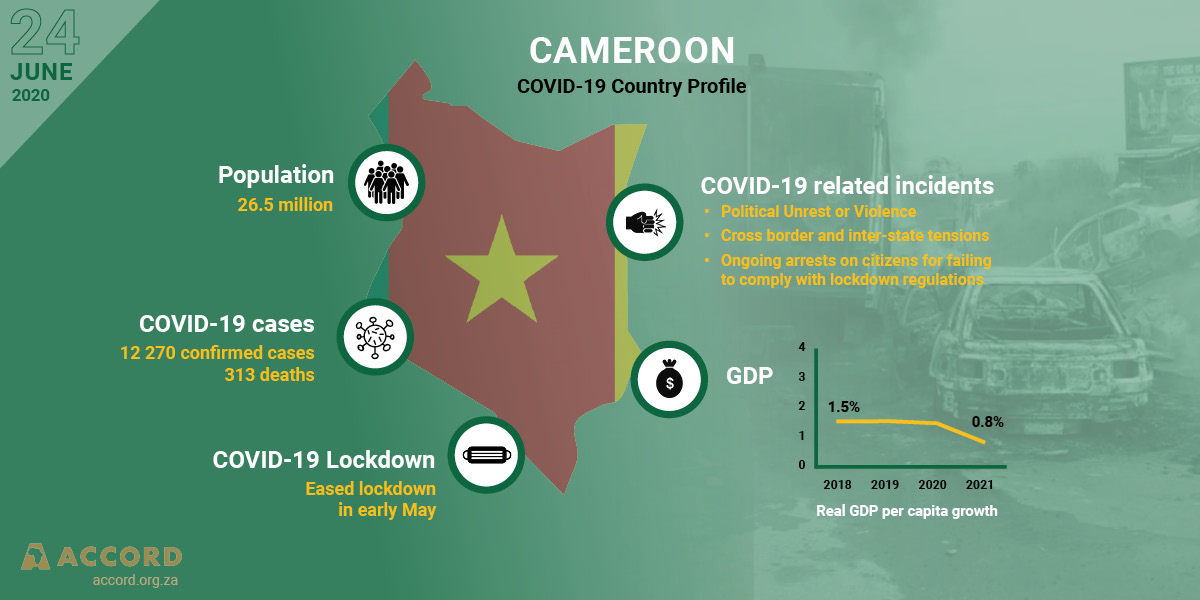In 2017, low-intensity conflict emerged in the Anglophone regions of Cameroon, where several separatist groups launched an armed insurgency against the national government. Three years on, this insurgency has already claimed approximately 3 000 lives, resulted in the internal displacement of an estimated half a million people, deprived 700 000 children of schooling in their home areas and left one in three people in the affected regions in need of humanitarian aid. To date, an estimated 58 000 Cameroonian refugees have been registered in Nigeria. The conflict heavily restricted movement, effectively putting many urban and rural areas on lockdown long before the COVID-19 pandemic.
The spread of COVID-19 in Cameroon has added additional pressure and strain on a civilian population already faced with a worsening internal conflict and man-made humanitarian disaster.
Tweet
In March 2020, United Nations Secretary-General António Guterres appealed for a global ceasefire. In Cameroon, only one of 16 armed groups, the Southern Cameroons Defence Forces (SCDF), unilaterally declared a ceasefire and committed to the cessation of hostilities during the current COVID-19 pandemic. According to the United Nations Children’s Fund (UNICEF), an estimated 225 of the 7 421 health facilities in the North-west and South-west regions of Cameroon – the epicentre of this conflict – are either non-functional or partially functional as a result of the conflict. Some of the health facilities have been attacked, forcing medical professionals to flee the affected areas, thus further decreasing the number of health workers available to assist those affected by the pandemic and the conflict.
As of 10 June 2020, Cameroon had a total of 8 929 confirmed cases of COVID-19, with the South-west region accounting for 292 confirmed cases and 16 deaths thus far, and the North-west region having 179 confirmed cases and 31 deaths. While the war-ravaged regions account for only 21% of the total COVID-19 cases and 22% of the total number of COVID-19 deaths in the country, the spread of the virus and the limited access to those in need of assistance will more than likely see an increase in these figures.
The situation of the civilian population who have fled into neighbouring Nigeria is even more precarious, due to COVID-19-related measures and restrictions. The refugees depend on support from various humanitarian organisations, such as the United Nations High Commissioner for Refugees (UNHCR). Given the measures to curb the spread of the virus – including travel restrictions and the reduction of staff available to humanitarian agencies – the provision of much-needed support to refugees has been severely affected. According to the United Nations Office for the Coordination of Humanitarian Affairs (OCHA), all Nigerian states where Cameroonians have taken refuge have active cases of COVID-19. Due to the COVID-19 pandemic, Nigeria imposed restrictions, which include a ban on interstate travel as well as domestic and international flights since late March. In addition, all land borders have been closed due to concerns that Nigeria’s porous land borders could impede efforts to curb the spread of the virus, among other factors. These restrictions – necessary as they may be due to the spread of the virus – have taken a toll on the refugee population in Nigeria, as humanitarian operations’ supply chains have been disrupted.
The pandemic is contributing additional stress to refugees who are already grappling with severe malnutrition, overcrowded camps and a lack of adequate health and sanitation facilities. Overcrowding, for instance, makes social distancing almost impossible, and poor living conditions, which include inadequate hygiene and sanitation facilities in the refugee camps, provide ideal conditions for the spread of various diseases. These conditions, which remain largely unchanged, increase the vulnerability of refugees to COVID-19. Even in instances where humanitarian aid agencies have responded by installing hand-washing points and quarantine shelters in camps to reduce the spread of COVID-19, implementing social distancing during the distribution of aid remains a key challenge.
Rumbidzaishe Matambo is an intern within the Peace Support Operations Unit at ACCORD.

